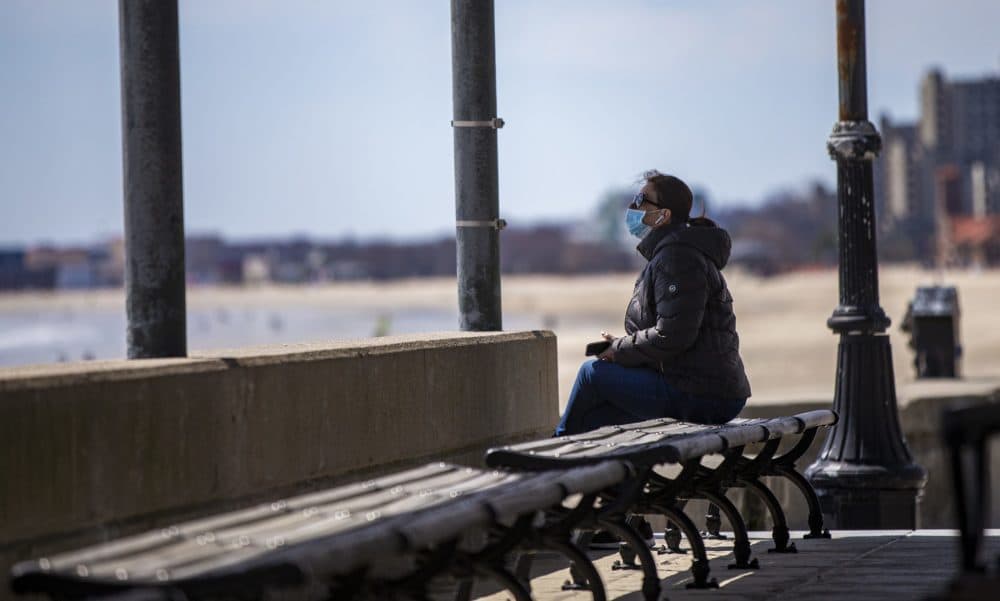Advertisement
COVID-19 And Black Lives Matter Have Spurred Real Change. Why Can’t Climate Change?
Resume
Cheri Schmitt is a teacher in Bedford who describes herself as eco-conscious. She says she and her husband have always tried to recycle and compost. But when they had to start staying home due to COVID-19, they found themselves doing a lot more.
“We’re being very careful about food waste, because obviously it’s not like you can just drop everything and run to the grocery store any time you want to," she says.
Driving less, shopping less, finding new ways to reduce disposable paper waste and reuse cloth towels and napkins— the changes Schmitt made in response to the coronavirus are some of the things scientists say can help reduce the carbon emissions that drive climate change.
Globally, the coronavirus-related shutdowns led to a 17% drop in emissions by mid-spring, though that trend has reversed as life has begun to resume.
Still, if lots of people could quickly form new habits like this during the pandemic, why didn't they do it sooner, knowing the need to act on climate change? Schmitt has an idea.
“I think it’s because, unfortunately, that’s part of the human condition," she says. "People don’t tend to want to focus on something until it’s in a crisis state.”
Social scientists say she’s right. Independent researcher Susanne Moser with Antioch University in Keene says the way we talk about climate change makes it feel distant, compared to something like the pandemic.
“'I have COVID going on right now, I have no job, I have kids to deal with.' I mean, those are the kinds of things that tend to get our attention much more easily," Moser says.
The threat of COVID-19 is immediate and easy to visualize, in that ubiquitous image of the spiky red ball, or in our family and friends, masked or in hospital beds.
There are also clear and impactful ways to show we care and we're taking action — like wearing masks in public. The urgency of these visuals got policymakers to act relatively quickly and decisively, at least at first.
Climate change, on the other hand, has dawned on us slowly — through predictions, scenarios, things that can sound hypothetical. Scientists have had to work for decades to get their consensus to sink in: that human activity is causing the problem.
“So when you then start a policy, you have to acknowledge that we are actually at fault," Moser says. "That's so not something you want to be caught with as a politician.”
Add a dose of economic fear and a powerful competing interest in the fossil fuel industry, and Moser says what might have been a straightforward call to action became political.
That’s actually what she says is happening now in the pandemic. The big changes didn't last – states reopened quickly in fear for their economies, only to see COVID-19 cases spike.
This might seem like a bad sign for our ability to sustain climate action over the long-term. But Moser is still hopeful. She says the massive collective actions needed to respond to climate change won't shut down the economy like the pandemic — instead, they'll create whole new industries and jobs, and make people healthier and safer.
Emily Diamond studies climate communication at the University of Rhode Island. She's also been watching the response to COVID-19.
“If fighting climate change requires massive structural change, we've just demonstrated that we can do it," Diamond says. "We’ve also demonstrated that when there's a threat that's urgent enough, we can really open our coffers in the United States in a way that we haven't seen in addressing most other issues — besides potentially going to war, in the past.”
Diamond studies how people’s identities shape their response to climate change. She says people are galvanized by threats to their sense of self, like their livelihood or a place they love.
She thinks she’s seeing that dynamic at work in an important way this summer: in the unprecedented number of white people joining people of color in protests over police killings of Black Americans like George Floyd.
Diamond, who is white, guesses that these protesters have probably always thought of themselves as supporters of racial equality — just as people might identify as eco-conscious.
Right now, she says people are being confronted with stories that make them feel they aren't who they thought they were, and they haven't done enough.
“That act of being called out, I think, is something that's really powerfully motivating," she says.
Diamond says this can be applied to climate change — that people who've felt they cared for a long time, should start to do more.
She thinks this moment is a call not just to individual action, but to structural change— to confront systemic racism and climate change at the same time.
“It's not enough to just carry your reusable bags to the grocery store or maybe sometimes bike to work instead of driving to work," she says. "We have to translate this into pressure to create political will and policy changes.”
And these issues are all related. Scientists say climate change and COVID-19 are both disproportionately hurting people of color and low-income communities.
Diamond says she hopes activists, scientists and policymakers will see the links between the crises, and start addressing climate change as a matter of justice.
This story is a production of New England News Collaborative. It was first published by New Hampshire Public Radio on July 14.
This segment aired on July 16, 2020.